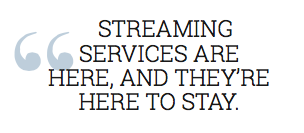Services can offer artists greater opportunities and listeners more control
Music streaming revenue from services like Spotify and Apple Music has only been increasing in the last few years, and these services are changing the way people listen to music.
According to the International Federation of the Phonographic Industry’s “Digital Music Report,” streaming revenue was up 45.2 percent in 2015, accounting for 43 percent of all digital sales.
The report added that the number of paying subscribers increased from 41 million in 2014 to 68 million in 2015.

TUNES — Music streaming services have grown in popularity with the rise of companies like Spotify, Tidal and Apple Music. Photo credit: Google Images
With numbers such as these, some artists are concerned that the increase in streaming’s popularity will have an impact on their income.
Taylor Swift, The 1975, Coldplay and The Black Keys are only a few examples of artists who have either withheld or delayed their most recent releases from Spotify.
According to Spotify Artists, Spotify’s platform for explaining the details of their service to potential artists, the streaming company typically pays out between $0.006 to $0.0084 per stream for any given track.
At an average of $0.007 per stream, it would take 185 streams to reach the typical $1.29 price of a song download on iTunes.
For an album, it would take 1,713 streams across all the tracks to make up the average $11.99 cost to purchase the album digitally or physically, but are their concerns actually warranted?
According to a working paper published by the National Bureau of Economic Research written by Luis Aguiar and Joel Waldfogel, streaming may not be so bad after all.
“Our analysis shows that interactive streaming appears to be revenue-neutral for the recorded music industry,” Aguiar and Waldfogel wrote.
What that means is that even though Spotify offers ad-supported streaming for free, and as little per stream as they pay, the overall numbers are not changing.
“While we find evidence that Spotify displaces piracy, the new revenue generated through streaming payments (coming from formerly pirate consumers, buyers, or individuals that used to forgo consumption) is roughly offset by revenue reductions from the sale of permanent downloads,” Aguiar and Waldfogel wrote.
A new report could be released next week saying differently, but for now, streaming is not taking money from artists.
If anything, it is exposing more listeners to their music.
Many people who once listened to radio have switched to services such as Spotify and Apple Music.
It provides a similar experience, but they have more selection over what they listen to.
It is the exposure to new music and freedom to explore that makes Spotify good for the music industry.
In addition, the amount of new artists that listeners are finding through these services allows albums that may have otherwise stayed unbought on a record store shelf to be heard by a much larger audience.
So while artists like Taylor Swift say Spotify “undervalues” artists, according to Time magazine, that may not be the case.
Streaming services are here, and they’re here to stay.
Spotify, Apple Music and whatever new services come along are revolutionizing the music industry, and it’s for the better. They are not trying to undercut the artist’s value — they only want to change the way people listen to music.
And they already have.
With 68 million paying subscribers and countless others on alternative platforms or listening for free, music is changing.
Some people will still buy CD’s and want to own physical copies of their favorite music, and that’s fine, but many are moving out of physical ownership and into digital streaming.
Netflix did it with movies, and now Spotify is doing it with music.
Culture is moving forward, and people need to get used to it, because it’s not turning around anytime soon.
gee is a copy editor.
